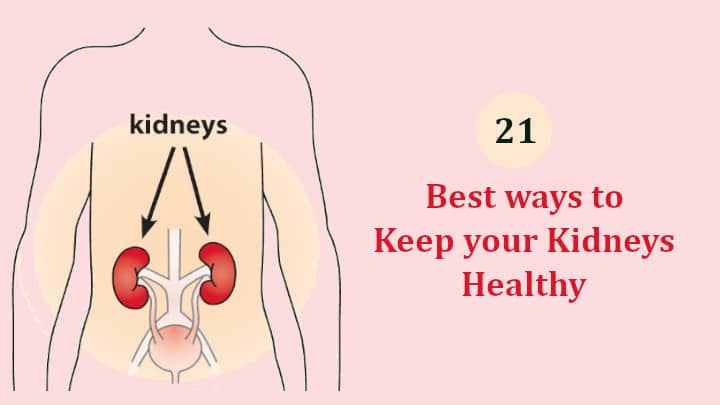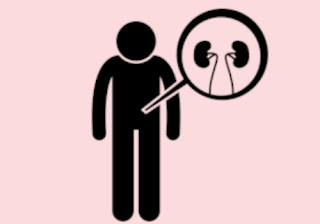21 Best ways How to Keep your Kidneys Healthy and Clean

Looking for how to keep your kidneys healthy? Every part of the body is important. Failure in any part of the body has a bad effect on health. Special care should be given to the heart, lungs, and kidneys.
There are two kidneys in the body. The main role of the kidney is to purify the blood and to filter water and sodium. It makes the enzyme renin, which plays a large role in controlling blood pressure.
Often, small stones pass out through urine, but large stones obstruct urine flow and cause pain in the waist and abdomen. For this, the kidney needs to be healthy. If you also want to keep the kidney healthy, then definitely read this article.
Your kidneys are fist-sized organs located under your rib cage, on either side of your ribs. They perform many functions. Mostly, they purify waste products, excess water, and other contaminants from your blood. These waste materials get deposited in your bladder and later pass out through urine.
In addition, your kidneys control the pH, salt, and potassium levels in your body. They also make hormones that regulate blood pressure and control the production of red blood cells.
The kidney is one of the most important organs of our body, and its main job is to filter blood and remove harmful toxins present in our body along with urine.
Most people fall prey to kidney-related diseases due to their bad habits and bad lifestyle. That is why you must take special care of kidney health. Today in this article, we tell you what you should do to protect yourself from kidney diseases and keep the kidney healthy.
By maintaining your kidneys healthy, your body will remove waste properly and develop hormones to enhance your body function properly.
How to Keep your Kidneys Healthy

1. Drink Plenty of Water
If you want to keep the kidney healthy, then drinking more water is a better treatment. For this, every normal healthy person should consume an average of 4-5 litres of water per day.
Water easily flush out many types of toxic elements present in the body with urine and keeps the digestive system functioning properly.
It does not cause constipation problems. Apart from this, water keeps the blood flow in the body and prevents the blood from becoming thick. By drinking more water, the level of blood pressure also remains balanced.
2. Keep yourself Always Active
Exercises help in keeping many kidney disease risk factors in control. A regular exercise routine will help you maintain a healthy weight, prevent diabetes, heart disease, and control blood pressure and cholesterol.
Exercise can not only help to keep your kidney strong but can maintain nutritional health.
3. Don’t Eat these things
Kidneys are the most functional organ for removing harmful substances from the blood. In such a situation, if you smoke and consume alcohol, you are also making the kidney weak. So give them a break.
The kidneys also filter over-the-counter medications, so never take more than prescribed and avoid medicines you don’t need.
4. Consider Your Kidney Profile
Some people are more prone to kidney disease and need to work harder for care. We understand that diabetes and high blood pressure are the biggest red flags, but many other aspects to evaluate. Heart disease, obesity, and smoking also topped the list, along with age and family history.
5. Periodically Get Kidney Exams
Kidney disease is also called the “silent killer”, as sufferers may lose kidney function before symptoms appear. To avoid this, you need to have frequent kidney checkups. If you have signs of kidney problems, then you should not ignore them all.
6. Check your Blood Pressure
You should check your blood pressure regularly. However, if high blood pressure doesn’t cause any symptoms, it can increase your risk of kidney and heart problems.
You can obtain a simple, timely, painless blood pressure test at your GP and free of cost at many high street pharmacies.
Your GP can suggest lifestyle changes or, if necessary, prescribe medication to lower your blood pressure if your blood pressure is higher than it should be.
7. Do not Smoke or Drink too much Alcohol
Both men and women are regularly advised to drink no more than 14 units of alcohol in a week. You should avoid smoking completely and limit the amount of alcohol you drink.
8. Track your Weight
Being overweight increases your blood pressure, which is bad for your kidneys. You need to maintain a healthy weight by staying active and not overeating. Your body mass index (BMI) is a useful way to check if you are at a healthy weight.
You can use a healthy weight calculator to work out your BMI. Get at least 150 minutes of moderate-intensity exercises, such as walking, bicycling, or swimming each week.
9. Control your Blood Sugar
People with diabetes, or a condition that causes high blood sugar, can develop kidney damage. When your body’s cells can’t utilize the glucose (sugar) in your blood, your kidneys are compelled to function extra hard to purify your blood. Over several years, this can lead to loss of life.
However, if you can control your blood sugar, you reduce the risk of harm. Also, if the harm is detected early, your doctor can make efforts to reduce or deter additional damage.
10. Be Aware of the Amount of OTC Pills you take
If you regularly take over-the-counter (OTC) pain medicine, you may be prone to kidney damage. Nonsteroidal anti-inflammatory drugs (NSAIDs), including ibuprofen and naproxen, can damage your kidneys if you take them regularly for chronic pain, headaches, or gout.
People with no kidney problems, who only occasionally take medication, are likely to steer clear. However, if you use these medicines daily, you may put your kidney health at risk. If you are struggling with pain, talk to your doctor about kidney-safe treatment.
11. Sunshine
It does not sound good to the kidney task much, yet when the sunlight tickles your skin, the cells of light-sensitive receptors will be encouraged to generate vitamin D.
As you know, vitamin D is essential to our health and brings many benefits to the body. The important advantages, such as cancer prevention, bone health, immune system development, and mobilization of phosphorus and calcium levels. Both of these things are important for kidney functions.
12. Juicing
While juicing is not a “cure-all”, enjoying vegetables and fresh fruit juice can more often maintain the kidney’s health naturally. Juicing daily will facilitate your digestive system to consume extra water and flush toxins and waste out of the body.
Yet, if you satisfy troubles with kidney processes, you need to avoid juices prepared from spinach, collard greens, beets, and other vegetables.
13. Qigong
The essence of qigong practice is reconciling your body, your soul on a higher level. In a thIn way, you bring your whole body completely in harmony.
Your body will be completely free from stress and mental distractions so that it has an unbounded potential.
14. Reduce Salt Intake
Salt improves sodium and blood pressure in the body and accelerates kidney problems such as kidney stones. So, lessen consuming salt in your food to deter the risk of kidney problems in common and kidney stones in particular.
15. Learn Relaxation
There is a great tie between stress and kidney benefits. Improved stress will direct to expanded possibilities of some kidney problems. Know to loosen up your body with some deep breathing training, meditation techniques, and yoga.
16. Increase Magnesium and Calcium Intake
Due to toxic excess and high blood pressure, when magnesium in your body is inadequate, your kidney process might be involved. Make sure that your body gets sufficient magnesium to maintain your kidneys functioning properly.
Kidneys execute an important role in stocking calcium supplements in the body. With less calcium intake, a kind of hormone affected by vitamin D can be released.
This hormone helps encourage the discharge of calcium through bones absorbed from your intestine. However, the kidney is energetically away from osteoporosis in kidney stones. So, you need to build a proper diet that includes calcium.
17. Avoid Resisting The Urge To Your Urinate
The Filtration of blood can reveal how your kidneys function. When the filtration is performed, water and toxins stocked in your urinary bladder need to be excreted.
Therefore, if you avoid the urge to urinate, your urinary bladder may spread much more than the standard capacity. This also affects the filtration of your kidneys.
18. Do not Eat Junk Food
Consumption of junk food in excess also has a bad effect on the kidney. Therefore, minimize the consumption of chips, burgers, pizza or sweet cookies, etc., in the daily diet.
19.. Low Intake of Sugar
A nutritionist explains that “The amount of sugar in the processed food available in the market is very high and by going inside the body, they disturb the balance of hormones and change the blood profile.
Excessive consumption of these things increases the risk of obesity and diabetes and directly affects kidney function. Therefore, consume less processed food in your diet.
20. Low intake of phosphorus
Experts and doctors say that increasing the phosphorus level in the body increases the risk of chronic kidney disease. Therefore, completely reduce the intake of phosphorus-rich things in your diet such as soft drinks, chocolate, processed meat, etc.
Be sure to read: Bad Habits that Damage Your Kidneys
21. Include these food for healthy kidneys

If the kidney is not properly cared for, there may be issues like kidney failure, kidney stone development, kidney cyst, etc. Let us explore which sustenances you can include in the food to maintain the kidney healthfully.
1. Red Capsicum
Red capsicum has more taste but less quantity of potassium in it. Red capsicum is rich in vitamin-A and vitamin C and folic acid, fibre, and vitamin B6. This vegetable comprises an antioxidant called lycopene. This can help prevent cancer.
2. Cauliflower
Cauliflower is a great source of nutrients like folate and vitamin C. The quantity of fibre in cauliflower can be effective for the kidneys.
3. Cabbage
The coleslaw ingredient in this is a good source of phytochemicals. It helps in staving off free radicals that harm the kidneys. Cabbage is the main vitamin B6, vitamin C, vitamin K fibre, and folic acid.
4. Garlic
Regular consumption of garlic helps in reducing the cholesterol level and removing the problem of inflammation. It is beneficial for the kidneys.
5. Onion
Onion is used in almost every kind of cuisine. Onion contains flavonoids. These antioxidants benefit in protecting the kidney away from diseases.
6. Grapes
Grapes have flavonoid properties. This helps prevent inflammation. You can eat grapes to maintain kidney health.
7. Strawberries
Strawberries are the sources of vitamin C and manganese. It contains anthocyanins. It is a powerful antioxidant. It can go a long way in keeping your kidneys healthy.
8. Cherries
Cherries have phytochemical and antioxidant properties. It can go a long way in keeping your kidneys healthy.
9. Egg white
Egg white is known for its healthy protein. It can provide essential amino acids. Due to the low phosphorus in the egg, white is a portion of healthy food for the kidneys.
10. Olive Oil
You can use olive oil in many types of dishes. It is beneficial for your kidney. Olive oil contains mono-saturated fat, which helps prevent oxidation. It is composed of oleic acid, which has anti-inflammatory properties. Due to its polyphenols and antioxidants, it can help in preventing oxidation.
Read Also: Signs and Symptoms of Kidney Disease Problems
In Closing
Your kidneys are important to your overall health. These organs work for many processes, from removing body waste to making hormones. This is why taking care of your kidneys should be a top health priority.
Maintaining an active, health-conscious lifestyle is the best thing you can do to ensure that your kidneys stay healthy.
So, now you are aware of multiple ways how to keep your kidneys healthy without any hassles.





